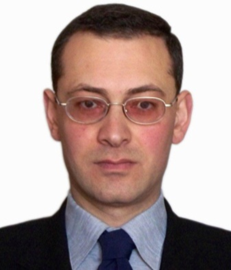A new crisis in US-Iran relations is unwelcome in the South Caucasus[Over]  By Benyamin Poghosyan, PhD, Executive Director, Political Science Association of Armenia By Benyamin Poghosyan, PhD, Executive Director, Political Science Association of Armenia
President Trump's decertification of the Iran deal will put in jeopardy a number of regional projects.
One of the key events shaping the geopolitics of the Middle East in the coming days most probably will be the US President Donald Trump's decision to decertify Iran nuclear deal (formally called the Joint Comprehensive Plan of Action - JCPOA), signed in 2015. President Trump has been a vocal opponent of the deal since he entered the Presidential race, and continued his tough stance on Iran after his election. The latest vivid example of this approach was President Trump's speech at the 72 Session of the UN General Assembly in September. READ MORE
Kurdish referendum has wide regional implications[Over]  By Benyamin Poghosyan, PhD, Executive Director, Political Science Association of Armenia By Benyamin Poghosyan, PhD, Executive Director, Political Science Association of Armenia
The 25 September referendum in the Kurdish region may not lead to Kurdish independence any time soon, but neighbouring countries are apprehensive.
On September 25, 2017 the long-anticipated independence referendum took place in the region administered by the Kurdistan Regional Government (KRG), and other mainly Kurdish populated disputed areas of Iraq. Those areas are outside of KRG administered boundaries defined by the Iraqi constitution, but currently are under control of Kurdish Peshmerga fighters. According to preliminary official results voting turnout was 72 percent and approximately 93 percent of participants voted for independence. READ MORE
Relations with China may help Armenia reduce its dependence on Russia[Over]
 By Benyamin Poghosyan, PhD, Executive Director, Political Science Association of Armenia By Benyamin Poghosyan, PhD, Executive Director, Political Science Association of Armenia
China's growing involvement in the South Caucasus may provide Armenia a much needed flexibility in its foreign policy.
On August 9, 2017 work started on the construction of China's new Embassy building in Yerevan. Armenian Foreign Minister Edward Nalbandian, Yerevan's Mayor Taron Markarian, and visiting Chinese Assistant Foreign Minister Li Huilai participated in the ground-breaking ceremony of the 40,000-square-meter embassy compound that should be completed by the end of 2019. READ MORE
- September 5, 2017 06:41AM
The South-West Transport Corridor Project and the Geopolitical Reshaping of the South Caucasus[Over]
 By Fuad Shahbazov, Expert-advisor, Center for Strategic Studies under the President of the Azerbaijan Republic By Fuad Shahbazov, Expert-advisor, Center for Strategic Studies under the President of the Azerbaijan Republic
Baku hosted the first joint gathering of the heads of the railway administrations of Iran, Azerbaijan, Georgia, Ukraine and Poland, on June 19. The meeting was dedicated to the newly-launched “South-West Transport Corridor,” which links into the broader Trans-Caspian International Route project launched in 2016. READ MORE
Iran-Russia Relations in the South Caucasus[Over]
 By Benyamin Poghosyan, PhD, Executive Director, Political Science Association of Armenia By Benyamin Poghosyan, PhD, Executive Director, Political Science Association of Armenia
Russia and Iran for the moment have shared interest in containing western and Turkish influence in the South Caucasus. In the longer term, however, their relationship in the region is likely to become more competitive than cooperative. READ MORE
The EU May Play Vital Role in Transforming Armenia[Over]  By Benyamin Poghosyan, PhD, Executive Director, Political Science Association of Armenia
By Benyamin Poghosyan, PhD, Executive Director, Political Science Association of Armenia
On March 21, 2017 Armenia and the EU initialed a new bilateral Comprehensive and Enhanced Partnership Agreement. This is an important milestone in bilateral relations, especially taking into account Armenia's last minute withdrawal in 2013 from initialing its Association Agreement negotiated within the framework of the EU Eastern Partnership program. READ MORE
Turkey-Armenia Relations after Turkey’s Elections[Over]  Armen Grigoryan, Armen Grigoryan,
EGF Guest Contributor
The outcome of Turkey’s recent parliamentary elections may partly reduce tensions in relations with Armenia, stopping the mounting hostile rhetoric of recent months. A normalization of bilateral relations should not be expected at this stage, but the trend of increasing cooperation in the humanitarian area, and in culture, tourism, and the media in recent years will likely continue. At the same time, some policies may need READ MORE
This article was first published by the "Central Asia-Caucasus Analyst, Central Asia-Caucasus Institute & Silk Road Studies Program Joint Center" which holds the copyright for it.
The South Caucasus between Russia and the European Union[Over]
 Elkhan Nuriyev, Elkhan Nuriyev,
EGF Affiliated Expert
The mounting tension over Ukraine has introduced numerous dangers to the security situation in the South Caucasus. These negative ramifications are further exacerbated by the fact that Russia holds the key to resolving conflicts in the post-Soviet realm, especially in the absence of greater Western assertiveness. But Moscow and Brussels are caught up in geopolitical competition over the region. READ MORE
One man, one party hangs onto power in Montenegro[Over]  Vasilije Boskovic, Vasilije Boskovic,
EGF Guest Contributor
Montenegro is the only former Yugoslav republic where there was no change of government since 1989. The same political party, the Democratic Party of Socialists (DPS), has ruled for 25 years consecutively. The party is led by Prime Minister Milo Djukanovic, who was also president of the Republic of Montenegro from 1998 to 2002. What are the reasons the same political elite can hold onto power for more than two decades? READ MORE
Click here to read also "Protest virus appears contagious in Bosnia".
- November 25, 2014 20:54PM
“Towards Europe?! Straddling Fault Lines and Choosing Sides in the South Caucasus” [Over] 10th Workshop of the PfP Consortium’s “Regional Stability in the South Caucasus” Study Group (RSSC SG)
On 6-8 November, 2014, the PfPC and the Austrian National Defense Academy jointly organized the 10th Workshop of the RSSC SG at “Schloss Rothschild” in Reichenau (Austria). This workshop offered a platform for constructive dialogue among government and academic experts on the prospective roles of the EU and the Eurasian Economic Union (EEU) in breaking the current deadlocks in the resolution of the protracted conflicts in Abkhazia, South Ossetia and Nagorno-Karabakh. During this workshop, a panel moderated by George Niculescu, the Head of Research of EGF, examined the background and the potential implications from the perspectives of South Caucasus (SC) states of having to make undesirable choices between the EU and the EEU. The panelists’ presentations and the ensuing discussion highlighted that, against the backdrop of the Ukrainian crisis, maintaining freedom of choice on the ways and levels of engagement with both the EU and the EEU is a critical interest for each SC state, and a prerequisite for effective conflict resolution. In this context, Mr Niculescu thought that “the EU might work towards developing options for harmonizing the European and Eurasian integration normative systems. One of the options to be explored might involve sustaining post-conflict regional economic cooperation as a way to circumvent the dilemma of the states caught in-between competing European and Eurasian integration processes.” READ MORE. Please see the relevant post on Facebook here.
- November 19, 2014 13:48PM
After the Vilnius Summit: EU’s Eastern Partnership at Crossroads[Over]  George Vlad Niculescu,
George Vlad Niculescu,
Head of Research, The European Geopolitical Forum
The Eastern Partnership Summit, held on 28-29 November 2013 in Vilnius, was supposed to highlight the progress achieved over the last four years by the EU on political association and economic integration with its eastern neighbours (Armenia, Azerbaijan, Belarus, Georgia, Republic of Moldova and Ukraine). Although it resulted in initialling the Association Agreements of Georgia and Moldova, and in signing a few minor agreements with other eastern partners, the summit was hijacked by the growing geopolitical competition between the EU and Russia. The primary victims of this competition have been Armenia and Ukraine, who, under strong pressure from Russia, put off their plans to sign Association and Deep and Comprehensive Free Trade Area agreements with the EU. Other eastern partners have also felt the cold wind blowing across Europe within their economic, energy or security relations with Russia. READ MORE
Armenia's choice of the Eurasian Union: A stunning end to its European integration?[Over]  George Vlad Niculescu,
George Vlad Niculescu,
Head of Research, The European Geopolitical Forum
The announcement at the beginning of September 2013, in Moscow, by President Serzh Sargsyan of Armenia's decision to join the Russia-led Eurasian Customs Union (ECU) apparently took many by surprise. Firstly, because in July 2013 Armenia concluded a lengthy four years negotiation on essential agreements, meant to upgrade its ties with the European Union (EU), which would be incompatible with joining the ECU. Secondly, because until recently (i.e. the run-up to the Vilnius Eastern Partnership summit to be held this fall) enlargement didn't seem a top priority for the ECU, the focus being more on making the customs union mechanisms effectively work for the existing membership. READ MORE
- September 27, 2013 10:54AM
Political Advisory Briefing: Egypt[Over] 
By Claudia Nocente,
Research Associate Global Security
February 2013
Key points:
- Egypt’s new administration between international praise and domestic unrest
- Morsi assumes pharaonic powers in an attempt to rid Egypt of Mubarak judges
- The felool take another shot in Egyptian politics
- The generals remain silent
- The Egyptian economy sinks. READ MORE
- February 12, 2013 14:21PM
Regional Integration as a Conflict Management Strategy in the Balkans and South Caucasus[Over]
 By Anna Ohanyan, By Anna Ohanyan,
EGF Affiliated Expert on South Caucasus region building
There is much enthusiasm among researchers and policymakers alike concerning the pacifying effects of trade and broader interdependence among states. The European Union is an often cited example of greater regional integration as a way to enhance peace and security among neighboring states. This comparative regional study draws from the cases of the Balkans and South Caucasus in order (1) to offer a descriptive account of patterns and processes of regionalism in politically divided conflict areas, and (2) to examine the extent to which such regional engagement can positively affect ongoing conflict management efforts in a given conflict region. The study advocates promoting regional structures as a new and potentially effective approach to peace-building and security enhancement, toward managing the many 'frozen conflicts' both in the Balkans as well as in the South Caucasus. READ MORE
China and the Iranian Nuclear Crisis: Between Ambiguities and Interests[Over]  Djallil Lounnas, Djallil Lounnas,
EGF Affiliated Expert with focus on Insurgency and Trans-national radicalism in North Africa and Sahel-Sahara
This article analyses, the complex relationship between Tehran, Beijing and Washington on the Iranian nuclear issue. Indeed, China’ policy towards Iran has often been described an ambiguous, in supporting Washington, on the one hand, while protecting Tehran, on the other hand. In this article, we argue that, in fact, Beijing policy vis-a-vis Tehran depends on the state of its relationships with Washington. Indeed, a closer analysis shows that China is using Iran as a bargaining chip with the United States on, among others, two key security issues, i.e., Taiwan and the oil supply. e guarantee of a secured oil supply from the Middle-East in addition to a comprehensive policy of the US with regard to Chinese security interests in Taiwan as well as the use of smart sanctions against Tehran, which would thus take into account, to a certain extent, Beijing economic interests in Iran, are, indeed, the guarantee of Beijing’ support to the US policy towards Iran. Click here to read more.
Rivalry in the Eastern Mediterranean: The Turkish Dimension[Over]  Mehmet Öğütçü, Mehmet Öğütçü,
EGF Expert
The discovery of large gas reserves off the coasts of Israel and Cyprus posed a number of dilemmas for Turkey. Its response reflected both resource rivalry and underlying political conflicts. Turkey and its neighbors need to avoid harsh rhetoric and brinkmanship. Instead, pending solutions of bilateral differences, they should consider interim agreements to reduce risk and allow exploration and production to go ahead in a more predictable environment. To read more click here.
Rivalry in the Eastern Mediterranean: The Turkish Dimension[Over]  Mehmet Öğütçü, Mehmet Öğütçü,
EGF Expert
The discovery of large gas reserves off the coasts of Israel and Cyprus posed a number of dilemmas for Turkey. Its response reflected both resource rivalry and underlying political conflicts. Turkey and its neighbors need to avoid harsh rhetoric and brinkmanship. Instead, pending solutions of bilateral differences, they should consider interim agreements to reduce risk and allow exploration and production to go ahead in a more predictable environment. To read more click here.
North Africa after the Arab Spring[Over] Political Outlook for Morocco, Algeria, Tunisia, Libya and Egypt
Key points:
- Morocco’s monarchy seems to have survived the wind of change blowing on Arab countries last year and is
currently trying to hold on to its power by allowing reforms that partly reduce its absolute authority.
- The adoption of a new constitution and the victory of moderate and nationalist Islamic parties are signs that
mark Morocco’s gradual progress towards the demands of protesters who have taken the streets last year.
- However, civil society is not yet a primary actor in Moroccan politics and a widespread sense of communalism
is still missing.
- Tensions are still present in Morocco, due to the unresponsiveness of the central government regarding the
high levels of unemployment, structural corruption and deficiencies in welfare and health systems.
- Morocco has been praised by the international community for its counter-terrorism efforts, although major
security risks stem from the unresolved situation of West Sahara. High unemployment and persisting poverty,
however, continue to ensure fertile grounds for terrorist recruiters.
- New economic deals with the EU are expected to have a positive impact on the Moroccan economy, which is
of great interest for foreign direct investors.
READ MORE
Letter from Istanbul, by EGF International Expert on Energy Security, Mehmet Oguctu[Over]  by Mehmet Öğütçü by Mehmet Öğütçü
In his “Letter from Istanbul”, EGF International Expert on Energy Security, Mehmet Oguctu, argues that for the first time in several generations, there is a credible belief within Turkey that with the right policies, institutions and leadership, the country could well sit on the management board of the new world order by 2023, the centenary year of the founding of the modern Turkish state. Click here to read Mehmet Ogutcu’s letter
Turkey and Russia in the Black Sea Region: Dynamics of Cooperation and Conflict[Over]  by Dr. Oktay Tanrisever by Dr. Oktay Tanrisever
This policy brief examines the sources and limitations of Turkey’s relations with Russia since 2000 as well as the implications of Turkey’s lack of a clear vision for the Black Sea region for the future of its bilateral relations with Russia and the other international, regional and local actors in the Black Sea region. READ MORE
Muslim Brotherhood set to dominate Egypt's Parliament[Over]
 In a recent interview for "The Voice of Russia", EGF Expert on Radical Islamic Movements, Mikhail Roshchin, explained the political dynamics emerging between Islamist and secular political parties in Egypt following recent parliamentary elections. His key message for all stakeholders engaged in the formation of new governance institutions in Egypt was that the Muslim Brotherhood, which now forms the largest political bloc in Egypt's new parliament, is more likely to broker political deals with secular parties rather than develop any sense of "ideological alliances" with other, more radical, Islamist factions. This will most likely remove the concerns over "new shades of green" emerging in the ensuing Egyptian political landscape and lead to further fragmentation of the political environment in advance of the country's looming presidential elections, which are currently scheduled for June 2012. Click HERE for the entire interview. In a recent interview for "The Voice of Russia", EGF Expert on Radical Islamic Movements, Mikhail Roshchin, explained the political dynamics emerging between Islamist and secular political parties in Egypt following recent parliamentary elections. His key message for all stakeholders engaged in the formation of new governance institutions in Egypt was that the Muslim Brotherhood, which now forms the largest political bloc in Egypt's new parliament, is more likely to broker political deals with secular parties rather than develop any sense of "ideological alliances" with other, more radical, Islamist factions. This will most likely remove the concerns over "new shades of green" emerging in the ensuing Egyptian political landscape and lead to further fragmentation of the political environment in advance of the country's looming presidential elections, which are currently scheduled for June 2012. Click HERE for the entire interview.
![Egypt_M[1].Roshchin.jpg Egypt_M[1].Roshchin.jpg](/upload/medialibrary/a04/egypt_mf1m.roshchin.jpg)
Armenia's choice in Nagorno-Karabakh: peaceful resolution or another war with Azerbaijan?[Over] 
By George Niculescu,
EGF Affiliated Expert
In the aftermath of the failed summit hosted by the Russian president Dmitry Medvedev between his Azerbaijani and Armenian counterparts, held in Kazan (Russia) on 24 June 2011, with a view to agreeing on a peaceful settlement of the "frozen conflict" in Nagorno-Karabakh, it seems that the future of South Caucasus might be threatened by the specter of a new war. READ MORE
|
|
